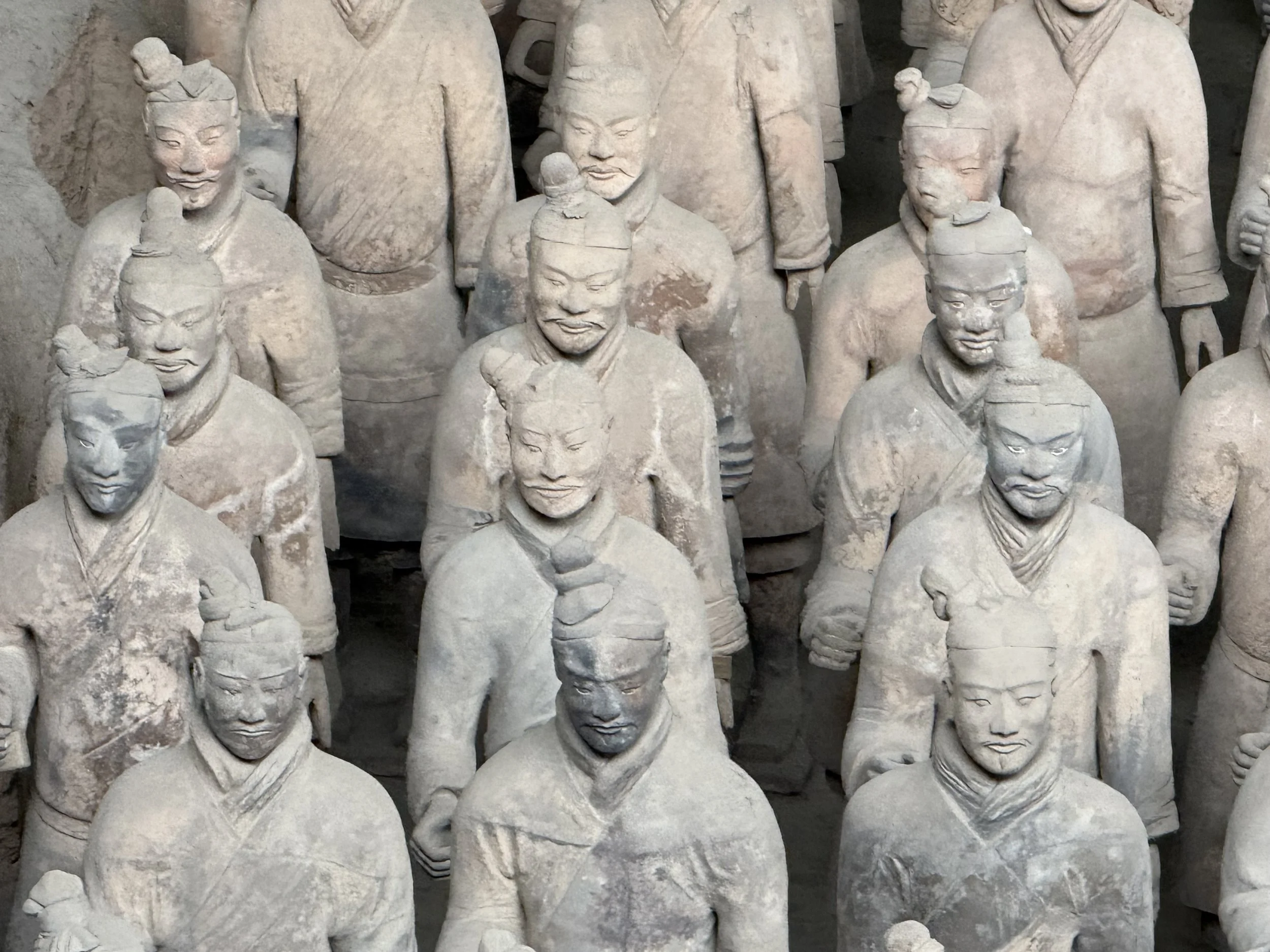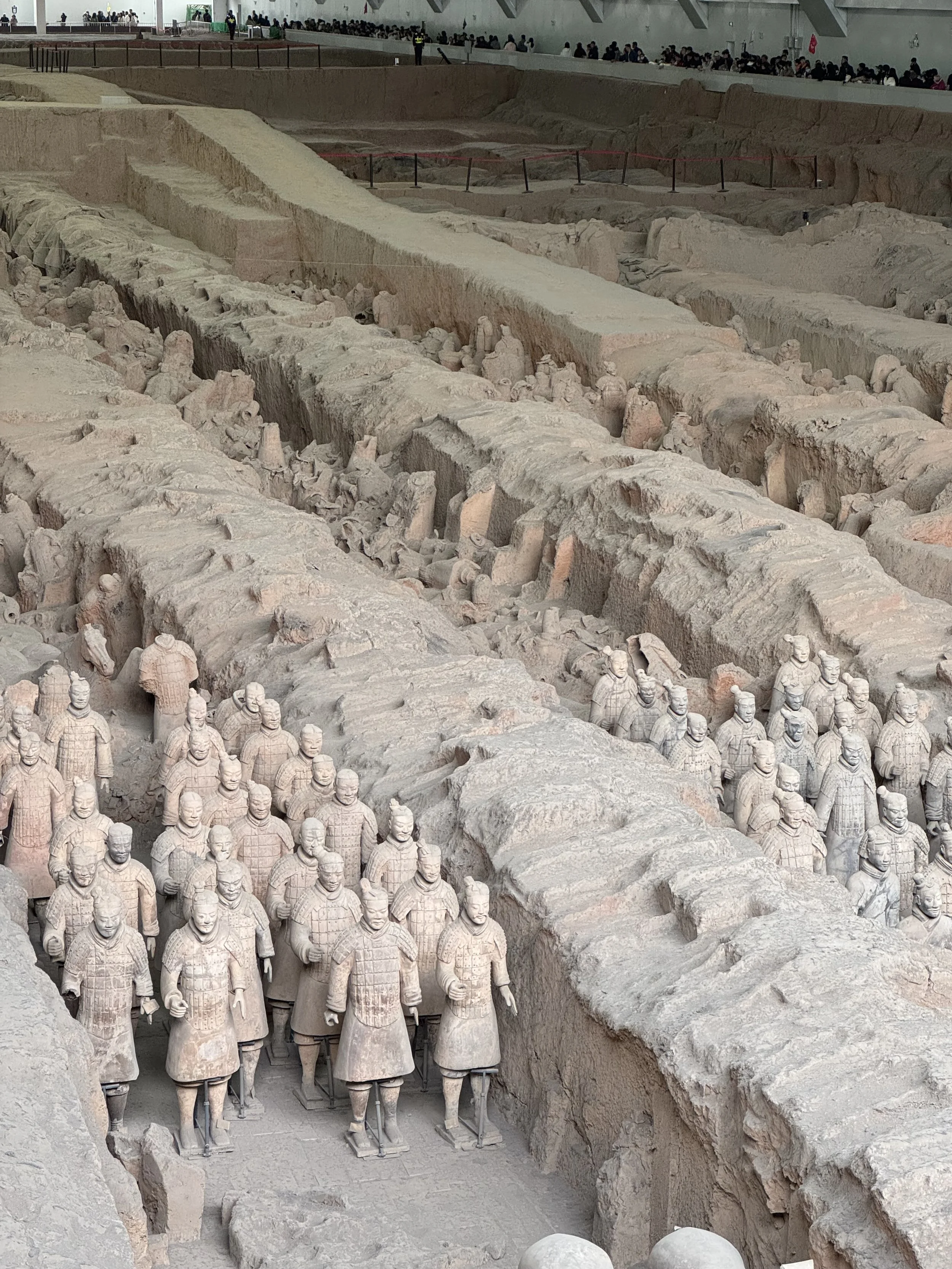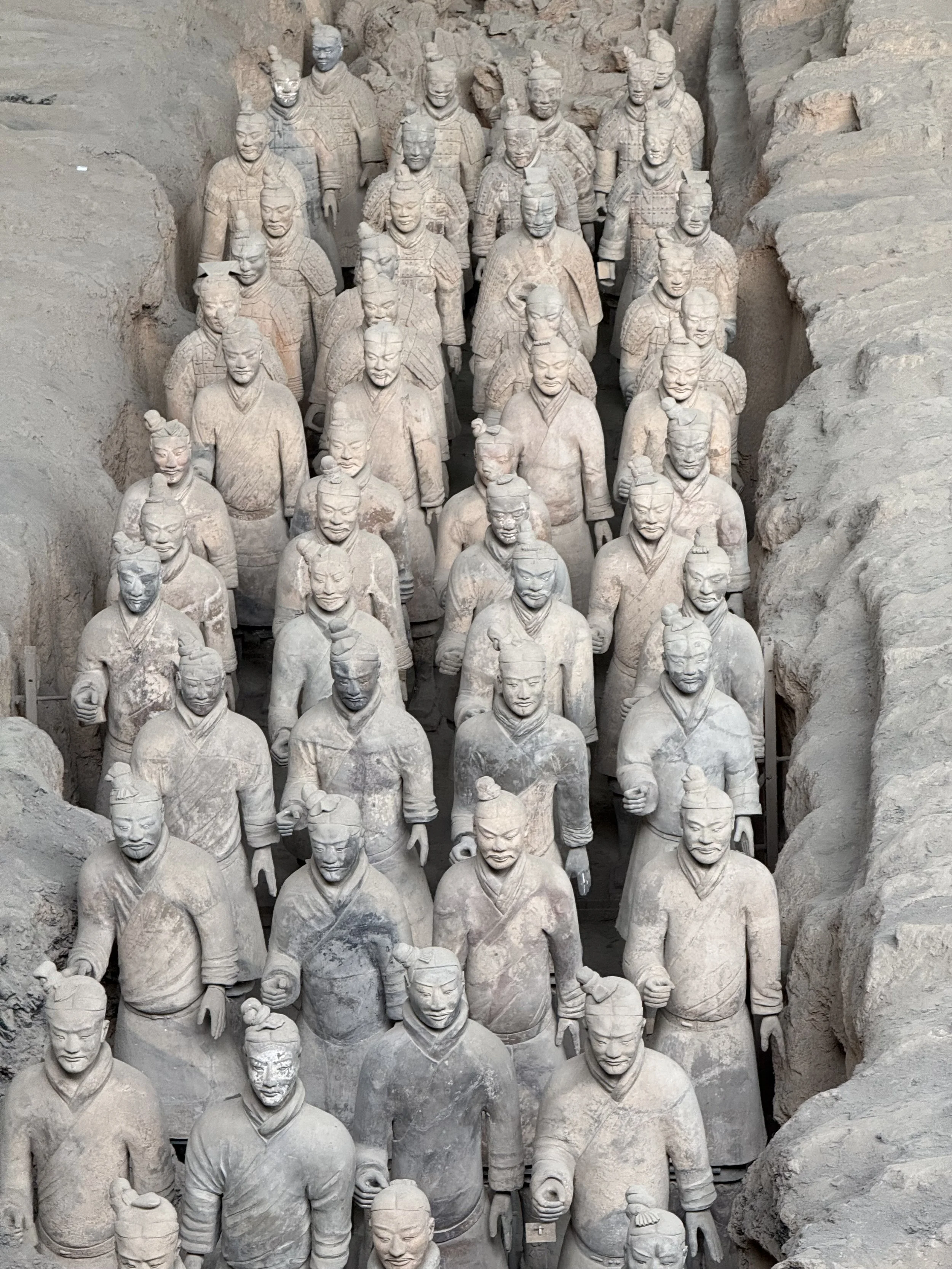5 Things We Have Learned This Week…#11
After a few weeks in China, we’ve started to settle in and that’s when you start noticing things. Not just the tourist highlights (though there are plenty), but the way of life, the patterns, the surprises… and the culture shocks. This week took us from the ancient capital of Xi’an to the spicy streets and panda-filled parks of Chengdu, and it’s been one of our most fascinating and emotionally draining stretches yet.
Here are five things we’ve learned this week.
1. The Terracotta Army is jaw-dropping and the story behind it is even better
We finally made it to one of the most famous sights in China: the Terracotta Army and even though we’d seen all the photos and read all the articles, it still blew us away.
Discovered by accident in 1974 by farmers digging a well near Xi’an, this underground army was built over 2,000 years ago to guard the tomb of Qin Shi Huang, the first emperor of a unified China. Before him, China was a patchwork of warring states. He conquered them all, standardised currency, weights and measures, and even helped lay the foundations for the Great Wall. You could say he was a bit of an overachiever.
Naturally, he wanted a grand send-off so he commissioned an entire mausoleum city, complete with rivers of mercury, trap-laden tunnels, and an army of over 8,000 life-sized soldiers, each one unique. There are horses, chariots, acrobats, even musicians. And they were buried with real weapons which wasn’t symbolic; it was serious prep for the afterlife.
Only a fraction of the site has been excavated, and the actual tomb remains untouched to this day due to concerns over preservation and safety. But what’s visible already is staggering. It’s hard to overstate the scale and ambition of it all. The fact that it lay hidden for millennia, only to be discovered by chance, makes it feel even more otherworldly.
We left speechless, humbled by the scope of history beneath our feet.
2. Everyone is on their phones because their whole life is on it
We’ve all seen people glued to their screens, but in China, it’s something else entirely. Thanks to apps like WeChat, phones have become the ultimate all-in-one tool. Messaging, ID, payments, travel bookings, health codes, social media it’s all in there. Your entire life, neatly stacked into a rectangle.
We were on the metro one morning and noticed that every single person was staring at a screen. Not a book, not a newspaper, not even idle people-watching. Just silence and tapping. It’s a fully digital society and it shows.
What’s interesting is that while we use our phones a lot too (especially for translation, navigation and of course taking photos), being here made us more aware of our own habits. In fact, you may have noticed but we decided to take a short social media break and it felt amazing. We noticed more. We looked around more. We found tiny temples, busy side alleys, and moments of stillness we might have missed. There were days we didn’t take any photos at all. In a place so connected, we rediscovered the joy of being a little disconnected.
3. The cashless society is efficient but it made us rethink things
Everything in China runs on QR codes. From restaurants to fruit stalls to public toilets, you scan to pay, scan to order, scan to open gates. Scan, scan, scan. Even beggars and buskers had QR codes around their necks. It’s insane, it’s fast, seamless, and kind of genius.
I used to be a huge fan of the idea. Why carry cash when your phone can do it all? I’ve had this view for years as our daily lives have slowly become more digitised. Ash & I haven’t carried cash in London for a long time and I used to laugh at my Dad for carrying cash when he visited us in London. But after a few weeks in China, my feelings have shifted. We’ve had moments where we physically couldn’t order food because we didn’t have the right app, couldn’t scan the menu, or couldn’t get the page to load. Everything needed an internet connection, an app, translation, a QR code. A quick coffee turned into a minor tech crisis. And forget speaking to a human everything is done through a screen even when there are people that could have helped.
It’s made me realise that efficiency often comes at the cost of connection. There’s no “hello,” no chat with the owner, no small gestures. And for people who aren’t tech-savvy, or tourists without a Chinese bank account, it can be incredibly isolating. We now understand more deeply why some people are hesitant about going fully cashless not because they’re old-fashioned, but because they value accessibility and humanity in a way technology can’t always replicate.
4. Culture shocks are real and they’re exhausting
We are fairly open minded people and travellers, and we’ve experienced plenty of cultural differences over the years. But China has delivered some of the most intense culture shocks yet and honestly, it’s taken a lot of energy to adjust.
We talked last week about the classic British view on manners but this week, it took on something different. The first thing that hit us? People can be surprisingly blunt. I can be a blunt person myself but I always make an effort to not come across rude. Queueing is more of a free-for-all. We’ve been pushed aside, skipped, and shouldered out of the way more times than we can count with zero malice, just pure practicality. At first, it seemed to be just the way but perhaps I’m starting to think it’s just rude. Spitting is completely normal (and loud). Restaurants are fast-paced and chaotic. Food arrives in no particular order, sometimes with no cutlery, no plates, and no explanation. And public toilets? Well… let’s just say we’ve seen some things.
Layer that on top of the digital everything - QR menus, no cash, silent service and daily life began to feel more like a puzzle than a routine. Even buying snacks or riding a bus took mental energy. It’s not bad it’s just different. But after days of navigating this system, we were often left completely drained.
That said, these are the kinds of challenges that make travel so transformative. We’ve learned to slow down, laugh through the confusion, and embrace the unexpected. Accept people for where they are, not where you want them to be. Someone said that once, I can’t remember who, but it rings true. Each day, we find new rhythms that make our time in China all a little easier.
5. Pandas are the cutest and they have the most ridiculous personalities
Now, let’s talk about the real stars of China: pandas. We visited the Chengdu Research Base of Giant Panda Breeding and it was glorious. There’s something surreal about seeing not one or two, but dozens of pandas doing what they do best napping, munching, tumbling, and generally living their best lives.
What surprised us most was how distinct their personalities are. Some pandas were show-offs, climbing trees just to make a scene. Others were goofy and awkward, rolling off platforms and then pretending it didn’t happen. There were chill pandas, clumsy pandas, shy pandas, and one very grumpy panda who glared at everyone while stuffing bamboo into its face.
It’s rare to see so many of the same animal in one place, and it made the experience feel more like watching a sitcom than visiting a zoo. We started naming them, giving them backstories, cheering them on like they were old friends.
The research base itself began in 1987 with just six rescued pandas, and now it’s a global leader in panda conservation. Pandas hold deep cultural importance in China they symbolise peace, friendship, and diplomacy (they’ve even been gifted to countries as political gestures). Given how endangered and famously bad at reproducing they are, centres like this are essential to their survival.
We left grinning like idiots. Pandas really are national treasures and now, personal ones too.
Final thoughts
This week was a real turning point in our time in China. We’ve gone from wide-eyed tourists to slightly more seasoned wanderers still confused half the time, but a little more comfortable in the chaos. It has been a transformative place, not just for us personally or newlyweds and it will change how we travel permanently. China is bold, complex, and full of contradictions. It’s efficient but chaotic. Friendly but blunt. High-tech but ancient. It doesn’t make it easy for you but maybe that’s the point.
And honestly, the lessons we are learning here, we will be better for it.
Next week, we’ll conclude our time in China by visiting Shanghai before turning our sights on Macau!





